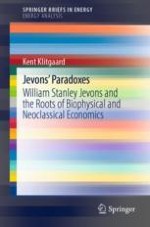
2022 | OriginalPaper | Chapter
1. Good Jevons, Bad Jevons: William Stanley Jevons and the Roots of Biophysical and Neoclassical Economics
Author : Kent Klitgaard
Published in: Jevons' Paradoxes
Publisher: Springer International Publishing
Activate our intelligent search to find suitable subject content or patents.
Select sections of text to find matching patents with Artificial Intelligence. powered by
Select sections of text to find additional relevant content using AI-assisted search. powered by